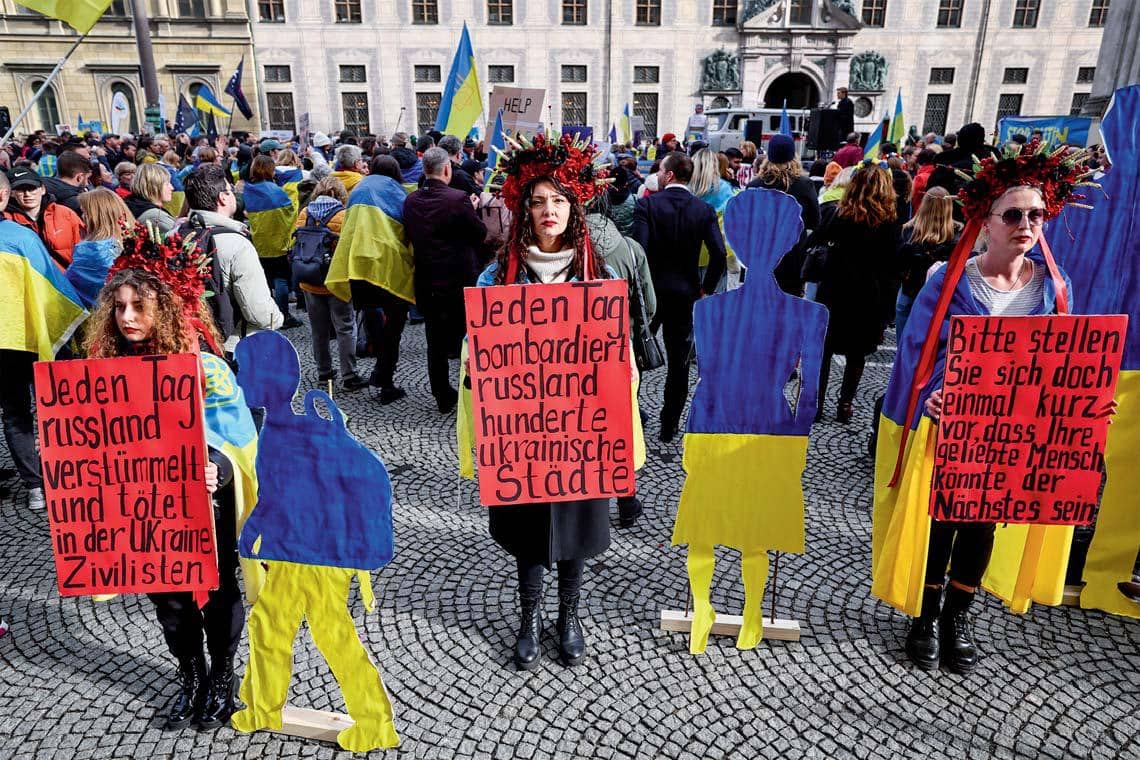
"We are the dogs of war," Paievska said as she introduced herself, explaining how she had started out as a volunteer and then worked as the chief medic at a hospital on the frontline during the siege of Mari- upol. "I had children die in my hands, civilians, elderly. I do not know how you can forgive that. Thousands of soldiers have gone through my hands, thousands of civilians, streams of blood, rivers of suffering."
She had herself been captured, beaten and tortured, and said every day had been a psychological and physical humiliation. "War, you know, it drinks our blood. It is never satisfied with our blood. It is always hungry. The more you give, the more she wants. But we made a commitment to our people.
She haltingly ended with an appeal. "To stop the war, we need to kill the war. Give us weapons to murder the war. We will manage, just help us a little bit."
It was a moment when those at the Munich Security Conference, a meeting of western politicians, defensive officials and academics, sensed what was at stake. It rephrased the question that the Ukrainian president, Volodymyr Zelenskiy, had put to the conference. In phraseology reminiscent of President John F Kennedy, he had said: "Please don't ask Ukraine when the war will end. Ask yourself why Putin is still able to wage this war."
With Alexei Navalny dead, the Ukrainians retreated from Avdiivka, the US Congress deadlocked over supplying a further $60bn in aid and the shadow of Donald Trump's return to the White House hovering over any discussion, Zelenskiy's question could not have been more pertinent.
This story is from the February 23, 2024 edition of The Guardian Weekly.
Start your 7-day Magzter GOLD free trial to access thousands of curated premium stories, and 9,000+ magazines and newspapers.
Already a subscriber ? Sign In
This story is from the February 23, 2024 edition of The Guardian Weekly.
Start your 7-day Magzter GOLD free trial to access thousands of curated premium stories, and 9,000+ magazines and newspapers.
Already a subscriber? Sign In

The Saudi football World Cup is an act of violence and disdain
Well, that's that then. In the event there were only two notes of jeopardy around Fifa's extraordinary virtual congress last week to announce the winning mono-bids, the vote without a vote, for the right to host the 2030 and 2034 football World Cups.

AI has made the move into video and it's worryingly plausible
I recently had the opportunity to see a demo of Sora, OpenAI's video generation tool, which was released in the US last Monday, and it was so impressive it made me worried for the future.

With tyrant Assad ousted, Syrians deserve support and hope
Last week, time collapsed. Bashar al-Assad's fall recalled scenes across the region from the start of the Arab spring almost 14 years ago. Suddenly history felt vivid, its memories sharpened. In fact it no longer felt like history.

TV
The Guardian Weekly team reveals our small-screen picks of the year, from the underground vaults of post-apocalyptic Fallout to the mile-high escapism of Rivals

Albums
Murky love stories, nostalgic pop and an in-your-face masterpiece captured our critics' ears in 2024

Film
Visual language, sound, light and rhythm are to the fore in the best movies of the year

Hidden delights Our 24 travel finds of 2024
Guardian travel writers share their discoveries of the year, from Læsø to Lazio

'It's really a disaster' The fight to save lives as gang war consumes capital
Dr James Gana stepped out on to the balcony of his hospital overlooking a city under siege. \"There's a sensation of 'What's next?'. Desperation is definitely present,\" the Médecins Sans Frontières (MSF) medic said, as he stared down at one of scores of camps for displaced Haitians in their country's violence-plagued capital.

Trailblazers The inspiring people we met around the world this year
From an exuberant mountaineer to a woman defiantly facing the guns of war, here are some of the brave individuals who gave us hope in a tumultuous 2024

Votes of confidence
From India to Venezuela and Senegal to the US, more people voted this year than ever before, with over 80 elections across the world. With rising authoritarianism and citizen-led resistance revealing its vulnerabilities and resilience in the face of unprecedented challenges, has democracy reached its breaking or turning point?